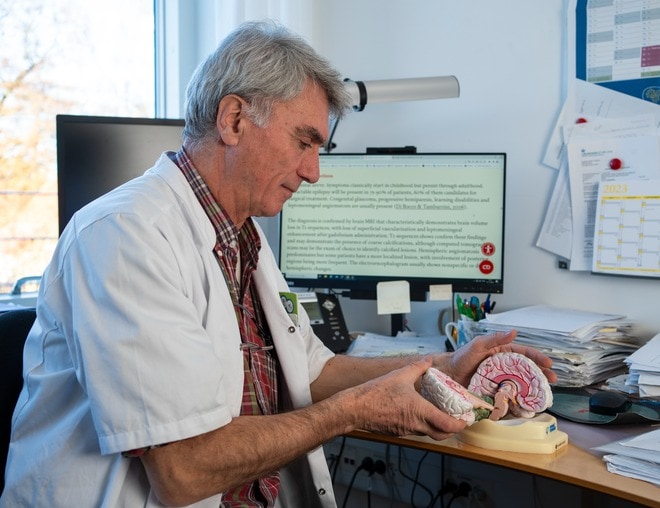
Researcher
Guido Rubboli
Academic Qualifications
Professor Guido Rubboli works in the Neurology Department at Filadelfia and the Institute of Clinical Medicine at the University of Copenhagen. Guido Rubboli is a trained neurologist from Bologna, Italy, and has been employed at Filadelfia since 2012.
- Member of the Management Group of the Coordinating Panel on Rare Neurological Diseases of the European Academy of Neurology
- Member of the European Academy of Neurology
- Member of the Epilepsy Scientific Panel, European Academy of Neurology
- Member of the Task Force “Transition in care from Childhood into Adulthood,” International League Against Epilepsy (ILAE)
- Member of the scientific committee “Epilessia – Fuori dall’ombra (Epilepsy – Out of the Shadow)”
- Director and tutor for VIREPA (Virtual Epilepsy Academy) ILAE, Advanced EEG Course
- Member of the Scientific Committee, KCNT1 Foundation
- Member of the Scientific Committee, KCNA2 Foundation
- Member of the Executive Committee, European Reference Network for Rare Disease – EpiCARE
- Member of the Rare Diseases Scientific Panel on Epilepsy, European Academy of Neurology
- Member of the ILAE Task Force “SNOMED-CT”
- Member of the Joint EAN/EPNS Task Force on Transition from Childhood to Adulthood
- Co-editor, Epileptic Disorder
- Section editor, Behavioral Neurology
- Associate editor, Frontiers in Neurology
- Editorial board member, Epilepsy and Behavior Reports
Watch the Film about Guido Rubboli
Guido Rubboli’s Research
The research has contributed to elucidating various aspects of epilepsy and related disorders. Guido Rubboli has helped to understand how certain types of seizures (myoclonus and myoclonic epilepsies) occur, which genes are involved in specific epileptic diseases, and how these genes affect patients. Additionally, Guido Rubboli has described how epilepsy manifests in children, especially when their EEG (electroencephalogram) shows epileptic activity during sleep. The research has also explored the possibilities for targeted treatments in rare epilepsies and epileptic encephalopathies, as well as refined the diagnostic criteria for certain epilepsy syndromes. This research is crucial as it enhances our knowledge of epilepsy, potentially leading to better diagnosis and treatment of people with epilepsy.
Research Areas
- Clinical Epileptology: This area focuses on studying and understanding epilepsy in patients. The research investigates how epilepsy affects individuals, the symptoms they experience, and the best methods for diagnosing and treating the disease.
- Epilepsy Genetics: This area involves examining how genes influence the development of epilepsy. Researchers aim to identify which genes may make individuals more prone to developing epilepsy and how genetics can help explain the disease.
- Epilepsy Surgery: This area deals with surgery as a treatment option for epilepsy. The research focuses on understanding which cases of epilepsy can be treated surgically and the best ways to perform surgeries to reduce or eliminate seizures.
- Clinical Neurophysiology of Epilepsy: This field studies how the brain’s electrical activity affects epileptic seizures. The research explores how the brain’s electrical patterns change during seizures and how these findings can be used to diagnose and treat epilepsy.





